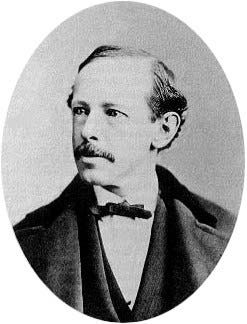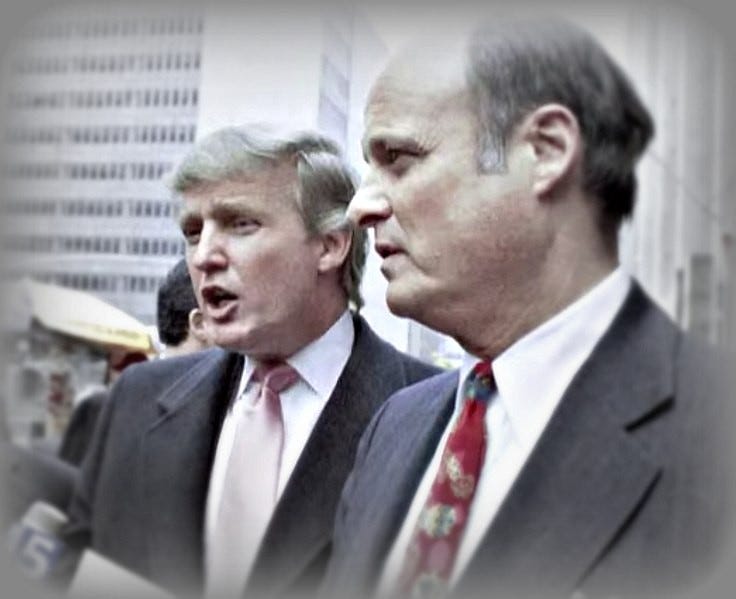Fred Trump, Fan Bingbing, and the Modern Gilded Age
Two dramatically different tales of tax evasion.
Two dramatically different tales of tax evasion.
The Gilded Age was a period when the United States was ruled more by wealth than by the state, and the country’s leading politicians were ineffectual, bloviating self-interested vipers with poorly styled, yet elaborate hair. Wealth was highly centralized during this period, and that centralization was getting ever worse, driving increasing numbers of citizens into poverty.
It was during this time that Horatio Alger penned the novel Ragged Dick, which describes the tribulations and eventual rise of a poor bootblack to middle-class riches and respectability. The American public ate up this, and subsequent books, by Alger, each of which followed a hardscrabble white boy who Leaned In and Vision Boarded his way to success.
Alger’s books came at the right time. When you are working yourself into a frenzy to merely eke out survival, you become, as the Germans say, notgeil, or “emergency horny”, for the promise that your labors will pay off. These emergency horny readers made Alger a very wealthy & successful man. He whispered sweet economic fictions into the ears of the long-suffering working class, and seduced them into making that fiction a reality for himself.
Alger was also an unrepentant sexual predator. In 1866, his church investigated claims that he had assaulted underage boys. Alger didn’t apologize for these assaults; he merely admitted he’d behaved “imprudently” and then fled town.
Which brings me to President Trump. This week, the New York Times published a special investigation into the wealth and tax evasion of the President, as well as his daddy Fred Trump who, not to equate physical appearance with morality, looked like fucking Satan impregnated an emaciated cow’s skeleton and covered the resulting skin-less fetus with strips of baloney that had gone bad and accumulated spots.
The Times report is meticulously detailed, and long. The take-away points are this:
1. Despite claims that he built his empire from a ‘small’ million dollar loan from father, Donald Trump was actually gifted $60.7 million.
2. Fred Trump bailed his son out of failed enterprises numerous times, to the tune of about $70 million.
3. The money bequeathed to Trump by his daddy ought to have been taxed 55%, the rate for large gifts and inheritances, but Trump actually paid closer to 5%.
4. Fred Trump created 295 separate channels to funnel wealth to his son while still advancing the narrative that Donald was a canny investor and independent leader.
5. Together, Fred & Donald conspired to siphon and hide income, undervalue assets, take advantage of tax loopholes, and defraud the government in equal measure.
The Times article is careful to mention that the line between flagrant tax fraud and canny loophole-exploitation is as wispy as Trump’s hairline. The IRS never pursued a case for the majority of these maneuvers, and they probably never will. Trump has never met consequences for his actions — like Alger, he’s been able to flee from recompense at every possible turn, usually thanks to daddy’s money.
This report also speaks to how flagrant a lie Trump’s small-businessman self-narrative truly is. Trump didn’t shine boots and turn a million dollar lump of coal into a vast edifice of gold; he atomized his daddy’s money, broke it into countless little worthless pieces and destroyed it, all while peddling a story of himself as a shrewd wheeler and dealer.
A lot of us never found this story compelling. Like Alger’s pulpy, saccharine novels, it was too shittily written to hold any appeal. But to some hard-scrabble, white, racist-or-at-least-willing-to-be-complicit-in-racism Americans, Trump weaved a tale they were emergency horny for. A tale of the boxed-in white dude, oppressed by the self-respect of women, people of color, and queer people, offended by others’ cruel insistence that he didn’t own everything, that this country wasn’t his.
To a certain political class, Trump’s story was, and still is, a bootstraps narrative of overcoming unfairness and taking what was rightly his. By singing a seductive song of selfishness and success, he seduced a large swathe of the American public into making it true for him.
We’re still in the Gilded Age. Thankfully, I do have a counter-narrative for you, an Alger story more tailored to leftie sensibilities.
In early July, hyper-successful Chinese actress and impossibly glamorous clotheshorse Fan Bingbing went missing. Bingbing, you must know, is a big fucking deal. She has been the highest-paid celebrity in China for four years running, is one of the highest-earning actresses in the world, and regularly steps onto the red carpet in looks that make even snide fashion bloggers like Tom and Lorenzo spout effusive praise, such as “my eyes are coming” and “nuclear-grade fabulous, bow the fuck down mortals”.
Bingbing is also, to a large extent, a self-made woman. Born into a military family with no media connections, in a country where connections are typically essential to acting success, Bingbing nonetheless was cast in costume dramas in the late 1990’s. Her talent, beauty, and ability to wear the fuck out of a garment were quickly recognized. She ascended to fame quickly, and has only gotten more famous with each ensuing year.
When Bingbing went missing, journalists speculated it had to with underpaid taxes. An investigation revealed she’d been under-reporting her income for years. Early this week, it came to light that Bingbing was being held under government surveillance for months.
On October 3rd, Bingbing came forward, and issued a statement in which she accepted the $130 million fine she owes the Chinese government, and apologized for “failing the country that nurtured [her]”.
The Chinese government has been trying to crack down on the lavish spend-thriftiness of its celebrities for many years now, claiming that extravagance corrupts the country’s youth. And this goes a long way toward explaining why Bingbing, unlike Alger and Trump, was not permitted to flee her responsibilities. In the American Alger mythos, glamorous wealth is the reward for hard work. Amassing sparkling, gilded things is a sign of virtue; it seduces the poorer populace into seeing their own hypothetical success reflected back in a shimmery façade.
We don’t issue apologies in this country. We don’t pay back what we owe. We certainly don’t acknowledge that we have been nurtured by our fellow citizens or our state. And that will be our undoing. Our country can’t imprison and surveil our wealthy with the ease that China can, and it’s tempting to see that difference as a sign of our freedom. We do love certain kinds of freedom in this country. Mostly the freedom to flee and to lie. It dooms us to keep re-enacting the corrupt stories of the past, but hey, at least it’s a very popular, comforting story.
This piece was originally read live at The Paper Machete, a weekly live magazine in Chicago’s historic Green Mill Cocktail lounge.










